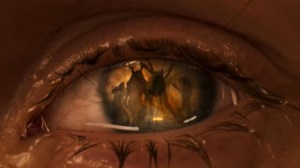A new era of Carnage will dawn on the Marvel Universe in November when Marvel Comics launches a new Carnage series from writer Torunn Grønbekk and artist Pere Pérez. While the Venom symbiote is getting to know a new host over in Marvel’s ongoing Venom series (also penned by Grønbekk), the new Carnage series sees the Carnage symbiote returning to the human it knows best, Cletus Kasady. While away, Carnage has been trying to rid itself of any weakness. One might assume that a reunion with Cletus would result in a killing spree, but things are more complicated than that.
Videos by ComicBook.com
ComicBook.com spoke to Grønbekk about the new Carnage series and what she has in store for the symbiote side of the Marvel universe. Here’s what she told us about Carnage’s quest for godhood.
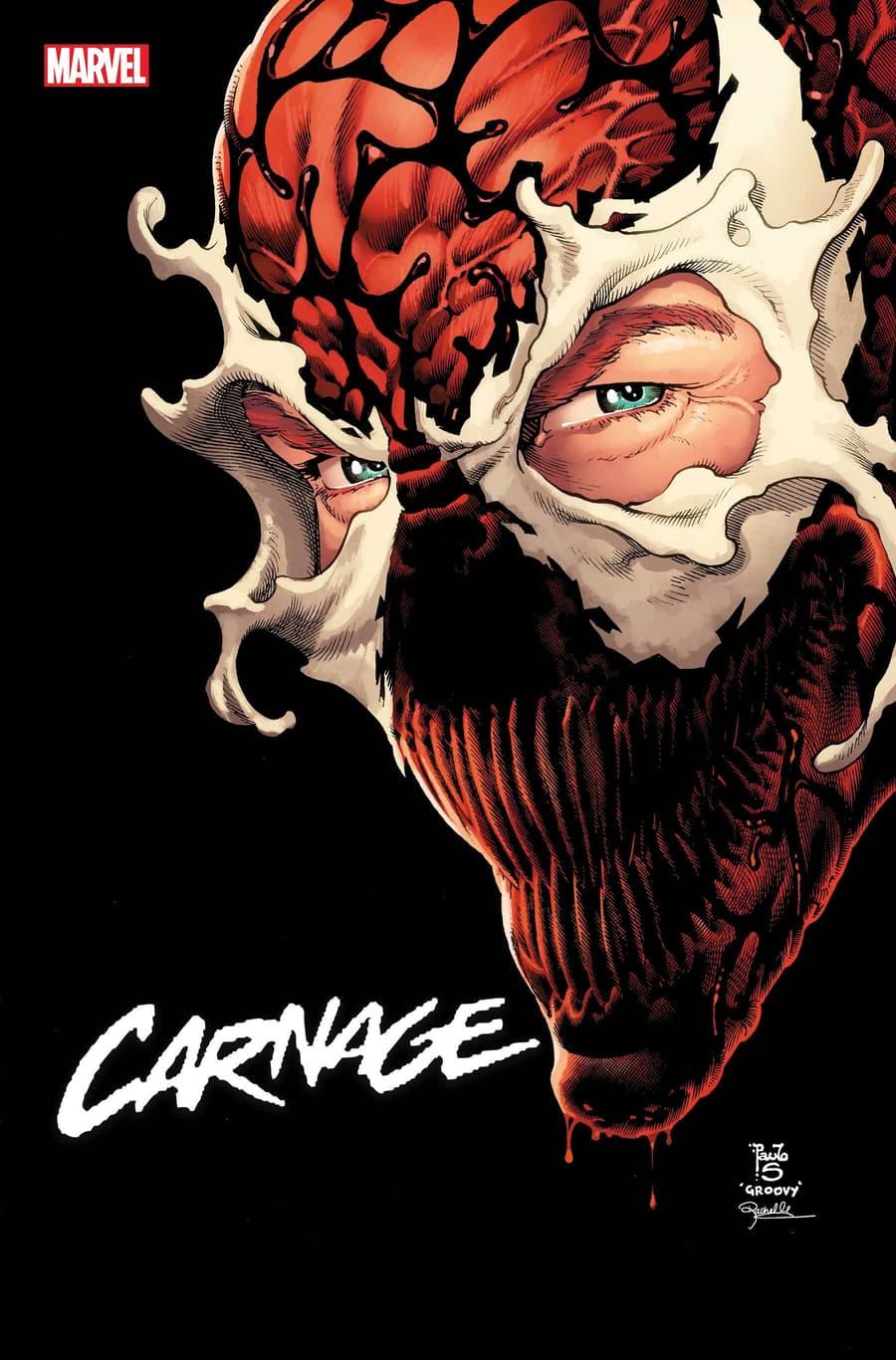
Jamie Lovett, ComicBook.com: If someone’s jumping into this series, what might they want to know about what Carnage has been up to recently?
Torunn Grønbekk: I think the main thing you need to know is that Carnage has been slowly trying to rid himself of any weaknesses, to the point where he’s playing with the idea of being a god and maybe killing some gods. Is that the next level? And Cletus Kasady is not necessarily on board with that idea, but that’s the main thing.
The announcement for this series made a big deal out of how this is a reunion for Cletus and Carnage. Why is that such a big deal? Venom seems to change host every other month. Why is this coming back to Cletus such an event?
Unlike a lot of the Symbiotes, Carnage and Cletus are intertwined in a very specific way, and I can only speak for myself here, but the thing that made me fall in love with Carnage was certainly Cletus. He’s the most interesting part and I think in a lot of ways, Carnage knows that. Speaking to readers too, I think people feel like Cletus and Carnage, they’re best together. We tried Carnage and he’s done a bunch of other things, but we do bring Cletus back in a very specific way. I’m not sure how much I should say, but this is sort of a love letter to the original Cletus in many ways, and I do hope that people who enjoyed or fell in love with Carnage for Cletus will enjoy the series as much as I’ve enjoyed writing it.
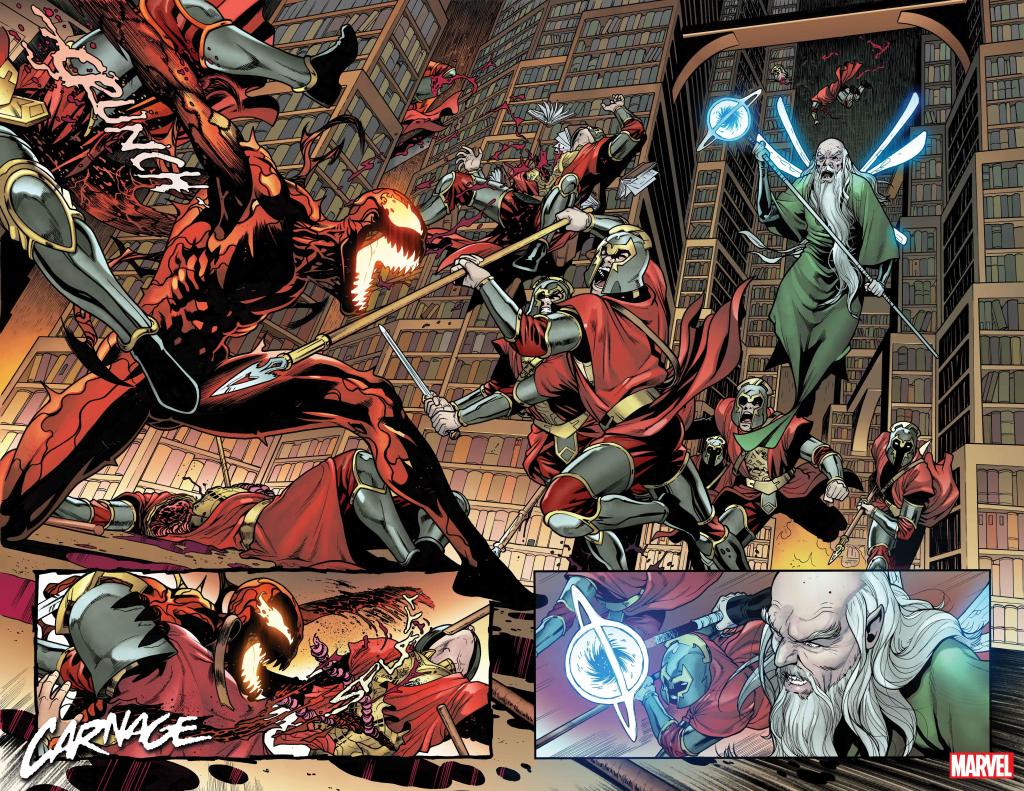
You mentioned finding Cletus to be the most interesting part of Carnage. Can you talk a little about that? Because I feel like under the wrong writer, the impression can be he’s a serial killer who likes to kill people, the end. What do you find more interesting about him that makes you want to write about this character and dig into him?
I think the thing is, he is a serial killer who likes to kill people. I’m not sure it’s “the end,” but it’s certainly there. Going back and reading through a bunch of the ’90s Cletus Kasady and Carnage comics, it became apparent that that is the throughline, the ode to the serial killer who likes to play with his food, and I suppose what’s interesting is Cletus has always wanted to kill people, but no one ever gave him like, “Oh, it’s because of his mother that he only kills women with blonde hair because blah, blah blah blah.” He just enjoys the killing part, and I think the playing part, the playing with his food, and the victims and everything.
I do think he is the most interesting and believable serial killer in the Marvel universe. What I’m trying to do is, what do you do when the challenge is gone? What makes Cletus, Cletus? Because Carnage has been slowly taking away all the weaknesses, absorbing things to make sure that he can withstand fire and heat and sound, all the things that used to be a problem, and if he’s invulnerable, is the challenge going to be there anymore? There must be a reason why he didn’t go around killing ants before, right? Because there’s no challenge to it. So, what’s going to happen if you make him into a god? And what kind of a god would Cletus Kasady be? And for whom?
That’s what we’re playing with, the idea of what is a Carnage god, and how would that apply to the world today? I can say we’re bringing Cletus back from the ’90s. How will he feel about the world today, that it has, in many ways, been recreated in his image since the last time he was conscious?
You’ve written for Thor for Marvel. Has your experience working on those literal, fully formed gods affected your approach to Carnage asking these questions about his own pseudo-godhood?
Oh, absolutely. I think the thing you realize very fast when you’re trying to write any mythology in anything is the limitations to godliness because no one has the actual powers of what we would consider the Christian God. Everyone has limitations and they are all failing. I suppose you can say that about the Christian God as well. If he had all of these powers that we can attribute him with, then why the fuck are we doing so poorly? That’s the question.
I suppose when you work with Thor and everything, you get a sense they have to have something that’s theirs that they care more about, and they feel a certain responsibility for. I’m trying to figure out what the scripture is according to Cletus. Who would look at Cletus Kasady and say, “Well, that’s my god”? We try to answer that without being too cultish or literal about it. I feel like this is the most relevant comic for the time we’re living in many ways. My approach to it is more about Cletus poking fun at patterns of humanity, the things we get obsessed with, the things we seem to consistently fail at, and expose that through his — well, we’re back to murdering — his many, many murders because there will be some murders.
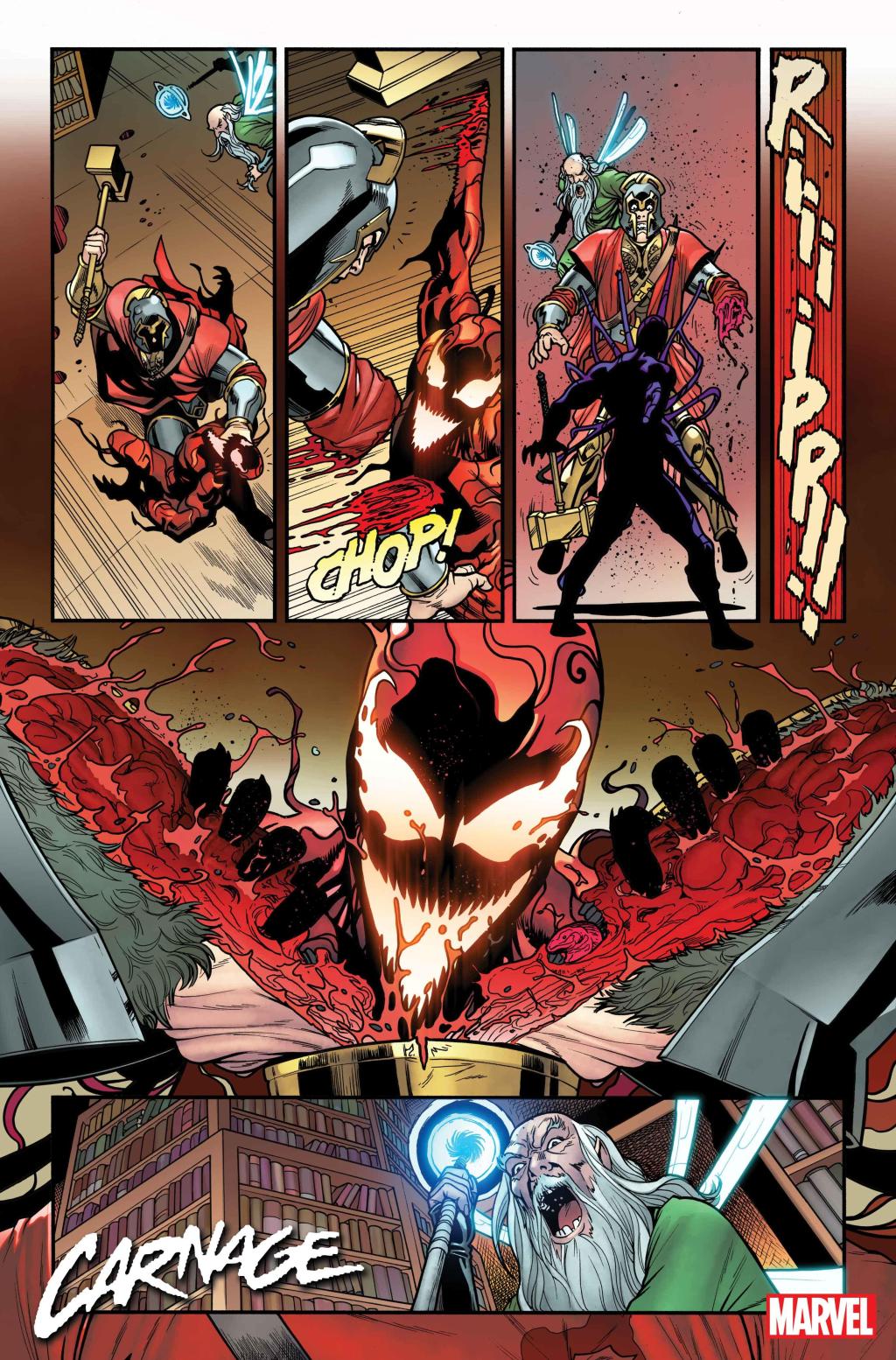
We have seen that cultish take on Carnage before. Can you talk more about how this take is different?
Well, it is the mystery of it all. And I think he’s trying to create faith because that’s what godliness is all about. To have faith, you have to have a mystery of some kind. Someone has to be, like, “No, I believe this thing,” which makes it not literal but all about who will be tempted, who will be interested.
The thing is, Cletus Kasady makes some good points. That’s what we’re trying to get to. And he obviously does so in horrible, horrible ways. But the idea is to try to get around to people going, “Well, I mean, I can see it. I can see the scripture according to Carnage.”
I think the team is amazing, the pages look stunning, and the subtlety of it all might be lost in all the blood and gore, but I do hope it’s there. I do hope people will read it and think, “Well, there is something here.” Carnage makes some points, is what I’m saying.
What atmosphere and tone are you and the art team trying to create? Are we looking a horror story? Something more noir? More action?
I would say we’re going a little bit ’90s. More realistic. There certainly are some symbiote nonsense horror pages. We have people being ripped apart. We have all the good stuff. But visually, I think it reads more ’90s realism in many ways. And Pere, he gets it. Every single page is exactly where it’s supposed to be. And our main — I suppose you can say hero in this, I’m not sure what team we’re playing on, at this point — but we have Flash Thompson as our Carnage main adversary. Flash is one of those characters that can be a little too smooth, but Pere nails the expressions and the moodiness of it all. It’s a joy, is what it is.
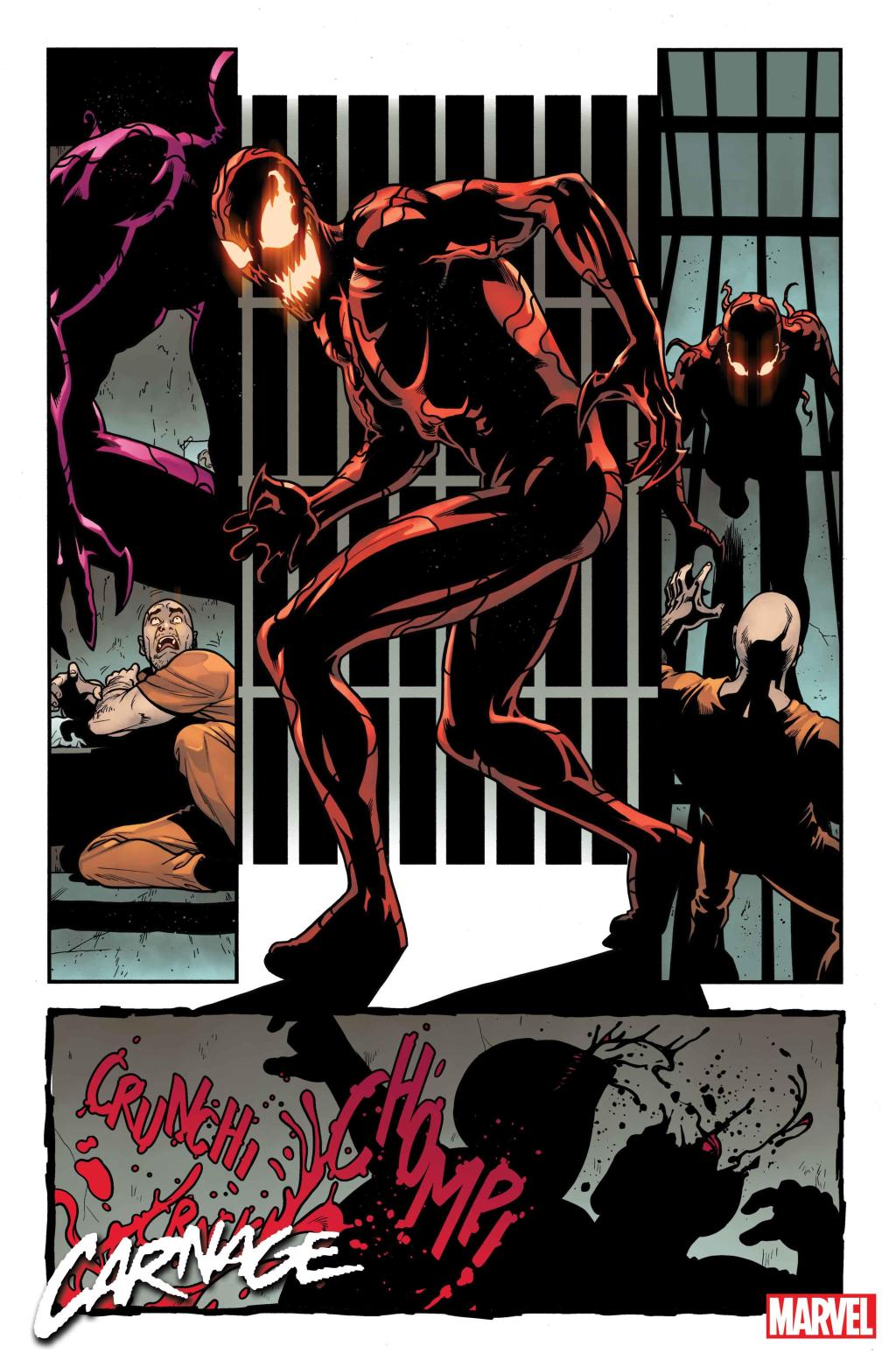
How would you say that Carnage is different from Venom? Because Venom now gets classified as an anti-hero, and I don’t think anybody would use the word “hero” even with “anti” in front of it to describe Carnage. What is the separating factor between the two of them in your mind?
That’s an interesting question. Venom, for the most part, is a hero who draws his own lines. Sometimes they’re a little further out than you might want them to be, but he’s also got a lot of love and respect for his host, especially in this run we’re doing now. There is certainly a lot of care for both Dylan and Eddie. He misses Eddie. And I think Venom, in general — if you look way beyond good and bad — is not destructive in essence, while Carnage is. But there is certainly a lot of love between Carnage and Cletus, I would say, too. But in essence, Carnage is destructive while Venom is not.
You’re also writing Venom, where Black Widow is coming in and getting that symbiote. Is this Carnage series intertwined with what’s going on there? Are these characters on a collision course, or is it too early to talk about where those roads lead?
I don’t want to say too much, but at some point, if you pay attention, there will certainly be some things. I think it makes complete sense to play around when you have the opportunity to do so, which we do. The two stories are set at the same time, in the same city, the same place, and you will certainly get a feel of that. Surely.
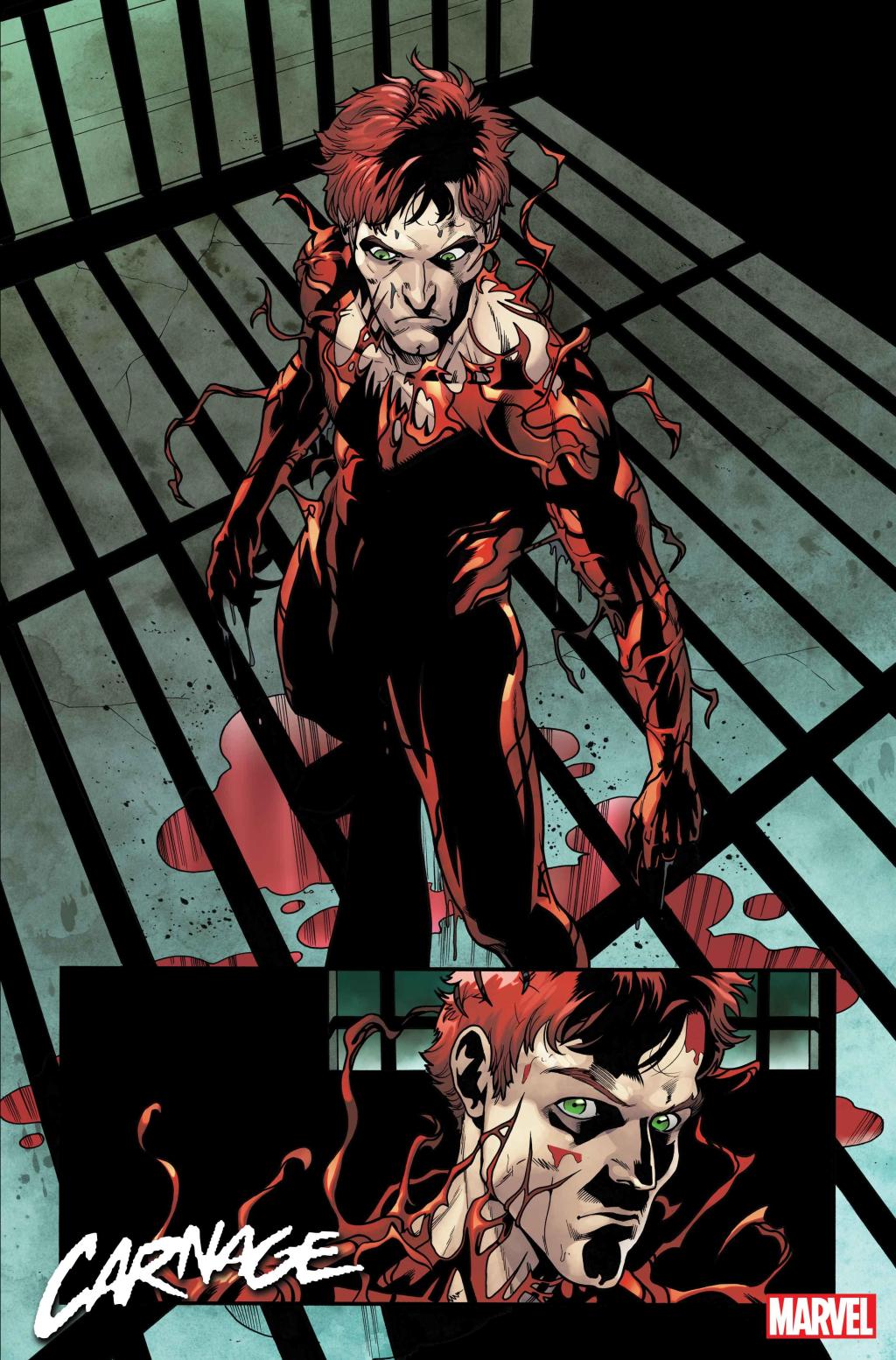
This may be getting into spoiler territory, but you mentioned two questions posed in this series: what is Carnage like as a god, and what happens after the challenge is gone for him? Can you offer any hint or tease as to what the answers might look like when he starts finding answers to those questions?
Well, I’ll say that Carnage, the symbiote, begins the series by having these questions asked by — someone asks him these questions. “What kind of god would you be if you were a god?” He doesn’t have the answers. That’s why he turns to Cletus Kasady, to get the answers, and Cletus takes on the challenge of figuring out what is scripture according to Cletus Kasady, or to Carnage, with passion. He really goes for it to try to figure it out.
I don’t want to say too much. We do play around with the idea of faith and God and what that means to people now because we do live in a very interesting time when a lot of people are losing their faith, but they’re still looking for spirituality. If the Marvel universe was real, and we knew that gods were real, and we had that confirmed several times, people would certainly turn to the gods they could find. But having said that, I do feel, in general, even though we are playing around with scripture and mythology and everything, it is, more than anything, a very human story. It’s very human-centric, as that’s what I like to do.
To me, I think this is the most relevant and interesting thing I’ve ever written for Marvel, and I sincerely hope that people will come along for the ride, even if you don’t like Symbiotes. Trust me, there’s some symbiote nonsense, but as long as you can get past Carnage throwing up a person, go with it, don’t overthink the symbiote nonsense, and enjoy the other stuff.
Carnage #1 goes on sale on November 15th.





